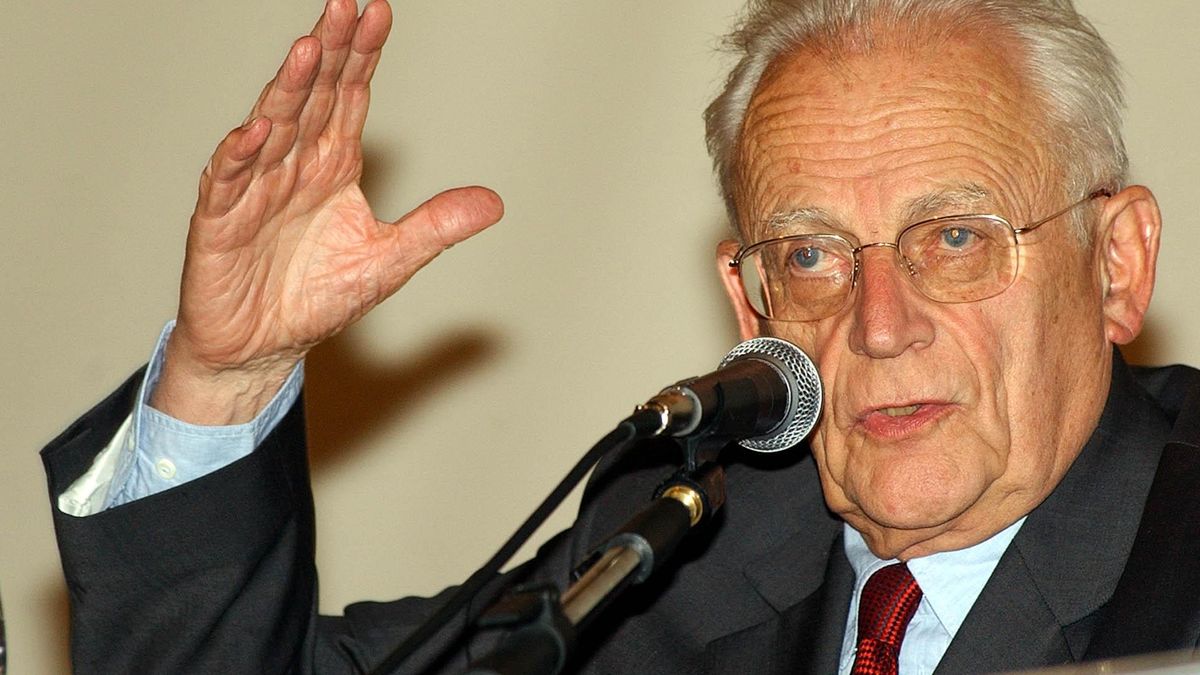Considered one of the most influential sociologists of the 20th century and father of the concept “post-industrial society” the french intellectual Alain Touraine He died at the age of 97 in Paris, leaving a rich legacy based on his research on contemporary social movements that was reflected in the analysis of May 68his contributions in exploring post-industrial society and his critique of neoliberalism.
Her daughter, the ex-minister Marisol Touraine, reported this Friday the death of his father, who had almost reached the century of life. Born on August 3, 1925 in Hermanville-sur-Mer, he grew up in a cultured and conservative family environment. His training was initially greatly influenced by literature, until sociology aroused his interest during a stay in the United States, where he had a revealing encounter with the ideas of sociologist Talcott Parsons. From that moment he became uncomfortable with the vision of society as a stable entity and began to explore it as something dynamic and constantly changing.
He graduated in History in 1950 at the Ecole Superior de Paris and finished his studies at the American universities of Rockefeller and Harvard. In 1956, Touraine founded the Research Center for the Sociology of Work at the University of Chile and, in 1958, the Industrial Sociology Workshop in Paris. In 1960 he received his doctorate in Letters and was Professor of Literature at the University of Paris-Nanterre; and in the 80s he founded the Center for the Analysis of Sociological Intervention, which he directed until 1993 and closed his last academic stage as director of Studies at the School of Higher Studies in Social Sciences in Paris.
From his first investigations in the Renault factories to his latest writings on the transformations of speculative capitalism, he never stopped analyzing the social or addressing profound changes or taking an interest in new cleavages. He always understood conflict as the engine of change.
French May.jpg
A good part of the studies of the first years of his career were based on the French May.
Touraine was already in May 1968 an eminent sociologist who taught at the French University of Nanterre, on the outskirts of Paris, where the student revolt took place that he now, 50 years later, claims led to the invention of social movements.
In the spring of that mythical year, Touraine counted among his students Daniel Cohn Bendit and Alain Geismarthe two visible heads of that movement that he supported and that he remembered as “the awakening of a youth charged with a new conscience, who knew how to read the meaning of history”.
“Consciously or unconsciously, at that moment there was the feeling of entering history. Others, including General and President Charles De Gaulle, feared they were leaving it and that is why they acted as they did,” the intellectual conjectured.
The “post-industrial society”
In addition, he was one of the founders of the concept of “post-industrial society”which examines the social implications of the transition from an industry-based economy to one supported by knowledge and information.
He warned how the service sectors (education, health, finance) are becoming key economic engines, while at the labor level there is a shift towards knowledge workers and the emergence of new forms of employment and labor organization, a process that It results in greater cultural diversification and social fragmentation, while at the political level it promotes autonomy and multiple identities that make citizen participation and social movements more relevant.
Throughout his career, he wrote about twenty books and countless articles, such as “Sociology of Action” (1965); “The Voice and the Look” (1978), about the research method developed during his stay in Poland, the so-called “sociological intervention”; and “Solidarity: analysis of a social movement” (1983).
In “A new paradigm for understanding the world today” (2005) analyzes the social change experienced by complex societies during the last two decades; and in “The world of women” examines the sociological construction of the female subject through a research work based on interviews. He also wrote, together with Ségolène Royal (the socialist leader who sought to reach the Elysee and competed with Sarkozy in 2007), “If the left wants ideas” (2008).
In addition to his research in France, he became interested in the political and social reality in other countries. Following Augusto Pinochet’s coup in Chile in 1973, he published “Life and Death of Popular Chile,” exploring the events and consequences of the coup against Allende. He also closely studied the rise and development of the independent Polish union Solidarity, which played a crucial role in the downfall of the communist regime.
His vision of Argentina in 2001
Knowing the history and politics of Argentina, he repeatedly set out to analyze the national situation. After the crisis of 2001during an interview with the correspondent Eduardo Febbro of Página 12, He criticized the reading of the outbreak in light of the concept of globalization.
“What bothers me is that this whole story of globalization is a purely ideological operation. They talk about globalization, internationalization when in reality it is about establishing an extreme capitalist system without any political or social control,” he said in that interview. For some people this is a condition of success, I would say it is a condition of failure against this backdrop of rising inequalities. I feel the world is sicker than you think. I don’t want to be cynical, but defeat of Argentina must make people realize how sick our world is for a country of such a high level to sink”.
I reject Brexit and the extreme right
In recent years, Touraine defined himself as “very European, perhaps excessively”. He expressed regret over Brexit and the rise of far-right politicians like Matteo Salvini in Italy. In an interview he gave to the Spanish newspaper El País in 2020, he pointed out that “the epidemic of nationalism occurs at a time when we still do not know the reasons and economic solutions.”
At that time, her prognosis for Europe was clear and was organized around feminism and immigration policy: “There are two fundamental decisions. First, liberation through women, that is, questioning the logic centered on reason and the reorganization of affects around reason and communication, thus creating a society based on care.Secondly, the reception of migrants, which I consider a crucial challenge.Today, the attitude towards migrants defines our European countries”.
Source: Ambito




